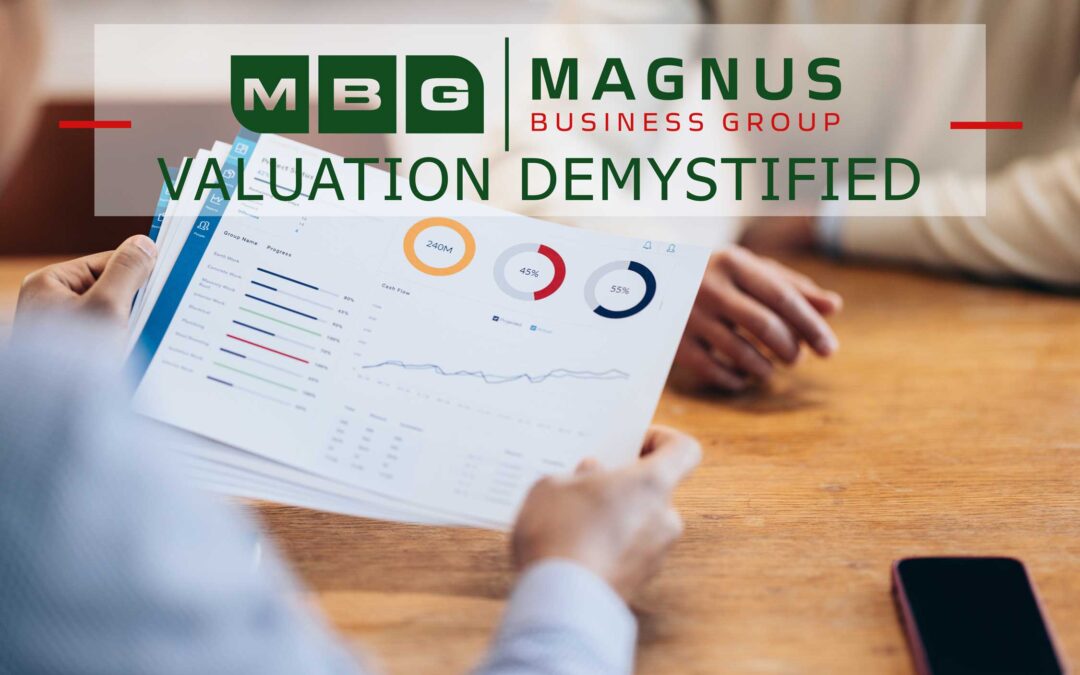What It Is, Why You Need It, And How to Get Started.
You’ve heard it before: to truly understand what your business is worth today—or if you’re planning to sell in the future—you need a valuation.
Business owners often find this concept confusing or are unsure of where to begin. Yet, knowing your business’s value is essential—whether you’re planning to sell, attract investors, or assess your company’s financial health.
Let’s break this complex topic into clear, actionable insights.
What Is Business Valuation?
At its core, business valuation is the process of determining a company’s economic worth. It goes beyond simply adding up assets or reviewing revenue— it’s about understanding the business’s current performance, future potential, and market position.
In other words, what would your business command in today’s market?
There are three primary valuation methods:
- Market Approach: This method compares your business to similar companies recently sold. Think of it like comparing real estate sales in your neighborhood. While popular, it often relies on precedent transactions that may not account for key factors such as your business’s size, unique model, and other critical characteristics.
- Income Approach: This approach calculates a company’s intrinsic value, focusing on its ability to generate income. It is the most accurate but also the most complex valuation method.
- Asset-Based Approach: This method calculates the fair market value of the company’s net assets. While straightforward, it’s best suited for asset-heavy businesses.
A professional advisor who understands the financials and the specific dynamics of medium-sized, privately-held companies is essential for an accurate valuation.
Finally, different valuation metrics apply depending on the business size:
- Seller’s Discretionary Earnings (SDE): Used for smaller companies with under $5 million in revenue.
- Earnings Before Interest, Taxes, Depreciation, and Amortization (EBITDA): Common for companies with over $5 million of revenue.
- Free Cash Flow (FCF): Typically reserved for even larger enterprises.
Each metric is valid but appropriate for different scenarios. Having the right professional insight ensures your valuation is accurate and aligned with market expectations.
Why Is Business Valuation Important?
Knowing your business’s value isn’t just about preparing for a sale. It has far-reaching implications:
- Strategic Planning & Growth: Understanding your valuation helps identify strengths, weaknesses, and growth opportunities.
At Magnus Business Group, we evaluate businesses using a comprehensive 8-part value scale. - Attracting Investors: Investors want to see clear evidence of your company’s worth.
- Exit Planning: If you plan to sell your business, a valuation is the first step in the pricing and negotiation process.
Common Misconceptions
- “My business is worth its annual revenue.” While revenue is a factor, profitability and market conditions play a much larger role in most industries. For example, SaaS companies employ a specialized approach known as the Magic SaaS Number, to determine valuation, emphasizing different metrics.
- “Valuation is only necessary when selling.” Regular valuations are essential for informed decision-making at all stages of business ownership. They highlight strengths, weaknesses, and opportunities. A valuation is indispensable if you want to grow your business or make it more efficient and robust.
- “Valuation is a one-size-fits-all process.” Every business is unique, and a proper valuation must capture those nuances. Factors such as team size, revenue model, and intellectual property are crucial in determining value.
Lastly, it’s important to remember that the value of a business is not always the same as the price you might achieve.
How to Get Started
- Gather Financial Records: Accurate, up-to-date financials are the foundation of any reliable valuation.
- Hire a Professional: A qualified business broker provides an objective and comprehensive assessment of your business.
- Plan for the Future: Use your valuation insights to identify areas for improvement and growth.
Final Thoughts
Business valuation doesn’t have to be daunting. Think of it as a financial health check—a way to understand where you stand and how to move forward. Whether you’re aiming to sell, grow, or secure funding, a clear understanding of your company’s value is a critical step toward achieving your goals.
Ready to Discover What Your Business is Worth?
We know business owners are busy — but when it comes to understanding your company’s value, there’s no better time than the present.
At Magnus Business Group, we specialize in guiding small business owners through smart financial decisions — and business valuations are a key part of that journey.
Click here to start your 3-step valuation process or contact us directly — we’re here to help!
Contact
Magnus Business Group, Inc.
Westlake Village, CA 91362
Phone: 805-259-4795
Email: info@magnusbusinessgroup.com

